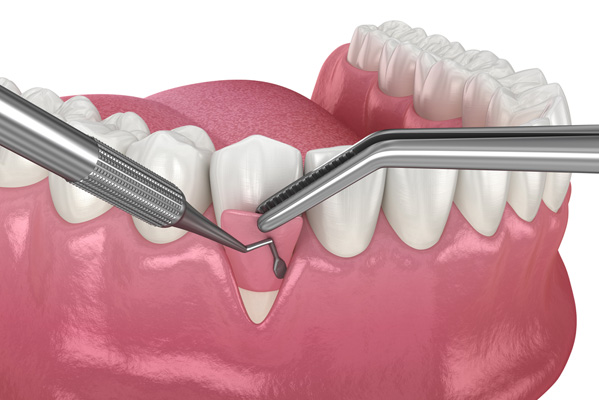Dental Crown LengtheningThe Woodlands, TX
Dental crown lengthening is a surgical procedure that recontours the gum tissue and, at times, the bone. It is designed to expose more of the tooth structure in preparation for tooth prosthetics. Afterward, the tooth is capped with a dental crown or overlaid with a porcelain veneer.
Dental crown lengthening is available at Montgomery County Periodontal Associates in The Woodlands and the surrounding area. Prepare yourself for restorative dentistry with a dental crown lengthening. Call us today at 281-404-7548 to schedule an appointment or learn more about our services.
Understanding Dental Crown Lengthening
According to MedicalNewsToday, dental crown lengthening is a procedure designed to reduce excessive gingival display (or excessively gummy smiles). An excessive gingival display may cause a person to appear to have short teeth, even if the teeth are of average size. The crown is the visible portion of the tooth above the gumline. If a patient has decayed or broken areas of teeth, they may require dental crown lengthening.
Dr. Mason can perform a dental crown lengthening procedure to expose enough tooth structure to fit a bridge or prepare for another restorative dental procedure. He may perform it on one or more teeth, even the entire gum line. Afterward, Dr. Mason may also detect cavities beneath the gum line or fractured areas of the tooth.
Check out what others are saying about our Dental Crown Lengthening services on Yelp: Dental Crown Lengthening The Woodlands
Types of Dental Crown Lengthening
There are three main types of crown lengthening techniques: gingivectomy, apically repositioned flap surgery, and surgical extrusion. Dr. Mason can determine the best treatment option for each patient depending on aesthetic considerations, the crown to root ratio, the proximity of the root, the presence of bone loss, the position of the affected tooth (or teeth), the appearance of the root, and the need for a filling or cap.
Gingivectomy
In a gingivectomy, the periodontist removes the gum tissue with a scalpel, laser, or electrocautery while the patient is under local anesthesia. Recovery is fairly quick, and any pain typically subsides after a few days to a week. Complete tissue healing takes four to six weeks if the surgery only removes the gum tissue.
Apically Repositioned Flap Surgery
In an apically repositioned flap surgery, Dr. Mason creates a flap of tissue by making a small incision in the gums. He will then lift the flap to remove the extra tissue (and, if applicable, bone). Afterward, he will reposition the flap toward the tooth's root. He will keep it in place with stitches, and he may also place a bandage or dental dressing over the area.
Surgical Extrusion
Surgical extrusion may be necessary when the tooth is fractured beneath the gum. In this procedure, Dr. Mason manually moves the tooth onto the desired location on the gum line. Restabilizing the tooth may require stitches; a wire or splint may be necessary to anchor the tooth to the surrounding teeth.
Recovering from Dental Crown Lengthening
Recovery depends on the exact type of procedure performed. However, the average recovery time is approximately three months. Fortunately, patients can carry out their everyday functions as the gums heal. Still, patients should avoid strenuous activity for the first two to three days. Patients should especially refrain from physically demanding jobs, heavy lifting, and heavy exertion.
It is not uncommon for patients to experience some discomfort as the anesthesia wears off, and some find relief with anti-inflammatory medications after the procedure. Minor swelling and bleeding are also normal, and Dr. Mason may prescribe a chlorhexidine mouthwash for use twice daily after the surgery. Once the initial healing phase has passed, gums will continue to shrink and pain and swelling will gradually fade away. According to MedicalNewsToday, it may take six to 12 weeks for full healing in the back of the mouth and three to six months for full healing at the front of the mouth.
Call Us Today
Excessive gingival show is not just an aesthetic issue — it can also affect your health. We at Montgomery County Periodontal Associates may be able to help. Call us today at 281-404-7548 to schedule an appointment or learn more about our services.
Frequently Asked Questions
How can I prepare for dental crown lengthening?
Come into the office for a checkup. From then on, Dr. Mason can determine whether the procedure is a good fit for you. Since you must have healthy gums and be in good overall health before the surgery, we recommend brushing at least twice daily, flossing at least once daily, and using a fluoridated mouthwash every day. Dr. Mason will also perform a presurgical analysis to determine the gum line's new location and assess the teeth, gum, and surrounding structures.
Are there any possible risks associated with dental crown lengthening?
Yes. Every procedure comes with its own unique set of risks. However, dental crown lengthening is a generally safe procedure. By following all postoperative care instructions, patients can help prevent infection. Bleeding at the surgical site is not uncommon, as is teeth sensitivity to heat and cold. There is also a possibility that the treated tooth will look longer than the surrounding teeth after tissue and bone removal. The treated tooth may also feel looser after removing bone from around it.
What is the general outlook for dental crown lengthening?
Over the years, oral surgeries like dental crown lengthening have become safer, more effective, and more efficient. By trusting yourself in the hands of a professional, you can feel at ease that the procedure successfully helps improve your oral health and extend the longevity of your teeth.
Can dental crown lengthening be done for esthetic reasons?
Yes. Esthetic dental crown lengthening is often performed to correct a gummy smile and increase tooth show. As such, patients can improve both appearance and oral health all in one go.
What are some warning signs that I should call a periodontist after my dental crown lengthening?
We will take all the necessary precautions to keep you as safe as possible. However, you should call us immediately if you are experiencing significant inflammation or pain, persistent bleeding, or any other possible signs of infection.
Contact Us
Montgomery County Periodontal Associates is located at 1001 Medical Plaza Dr Ste 110 The Woodlands, TX 77380.





